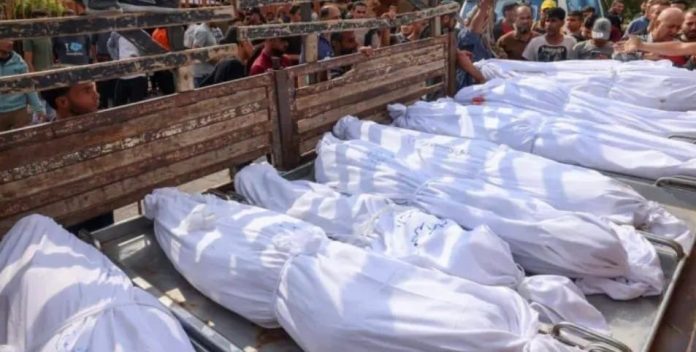27 May 2024: In a landmark move, the International Criminal Court (ICC) has issued arrest warrants for Israeli Prime Minister Benjamin Netanyahu and Security Minister Yoav Gallant. They are charged with war crimes and crimes against humanity committed in the Gaza Strip since October 8, 2023. The ICC’s prosecutor, Karim Khan, has also issued warrants for Hamas leaders Yahya Sinwar, Mohammed Deif, and Ismail Haniyeh, accusing them of similar offenses.
This decision comes in the wake of a devastating conflict in Gaza, where over 35,000 Palestinians have been killed, at least half of them women and children. The relentless Israeli bombardment has triggered a humanitarian crisis, displacing roughly 80% of the population and pushing hundreds of thousands to the brink of starvation.
Sami Abu Zuhri, a senior Hamas official, condemned the ICC’s decision, arguing that it unjustly equates the victims with their executioners and encourages Israel to continue its “war of extermination” in Gaza. The ICC was established in 2002 as the permanent court of last resort to prosecute individuals responsible for the world’s most heinous atrocities — war crimes, crimes against humanity, genocide, and the crime of aggression.
The court’s arrest warrants have significant implications. “The 124 countries recognized by the Hague Court will be obligated to arrest Prime Minister Benjamin Netanyahu, Defense Minister Yoav Gallant, Army Chief of Staff Herzi Halevi, and any person against whom an arrest warrant is issued whenever they arrive on their territory,” said a statement from the ICC. This effectively restricts Israeli leadership’s international travel, except to countries that do not recognize the court’s jurisdiction or those willing to pledge in advance not to arrest them.
The conflict, which began with Israel’s stated goal to dismantle Hamas in Gaza, has escalated under the full support of US President Joe Biden, who has been dubbed “Genocide Joe” by critics. Despite Biden’s earlier public declarations that a full-scale attack on Rafah would be a “red line” for the White House, the US has continued to endorse Israel’s military actions. The Israeli assault has deepened Gaza’s humanitarian crisis, with vital aid routes through Rafah and Kerem Shalom blocked, and more than 810,000 people fleeing Rafah in recent weeks.
Francesca Albanese, the United Nations Special Rapporteur on the situation in Palestine, has urged UN member states to impose sanctions on Israel, including an arms embargo, until it halts its military offensive. “Let’s be clear. As the ICJ orders Israel to stop its offensive in Rafah, Israel intensifies its attacks,” she said. Albanese called on all UN member states to “impose sanctions, arms embargo, and suspend diplomatic/political relations with Israel until it ceases its assault.”
The ICC’s decision has also stirred political upheaval within Israel and its close ally, the United States. President Biden criticized the prosecutor, asserting that “there is no equivalence — none between Israel and Hamas,” and Republicans have warned of sanctions against the court. The US has long opposed the ICC, fearing potential prosecutions of Americans and does not recognize the court’s jurisdiction, similarly to Russia and China.
Meanwhile, the global response has been mixed. In a significant move demonstrating Israel’s growing international isolation, Irish Prime Minister Simon Harris announced that Ireland, Norway, and Spain will officially recognize the State of Palestine from May 28. This decision aligns with a broader international sentiment that views the creation of a Palestinian state alongside Israel as the only realistic solution to the conflict.
Palestinian officials have welcomed these announcements, seeing them as affirmations of their decades-long quest for statehood in East Jerusalem, the West Bank, and the Gaza Strip — territories occupied by Israel since the 1967 Mideast war. With over 140 countries already recognizing a Palestinian state, this cascade of recognitions could build momentum at a time when Israel faces mounting criticism for its actions in Gaza.
The ICC’s warrants and the subsequent international reactions highlight the increasing global scrutiny of Israel’s policies and actions in Gaza, as well as the ongoing struggle for Palestinian statehood and rights. The world watches closely as the situation in Gaza continues to evolve, with the potential for significant geopolitical shifts in the region.




